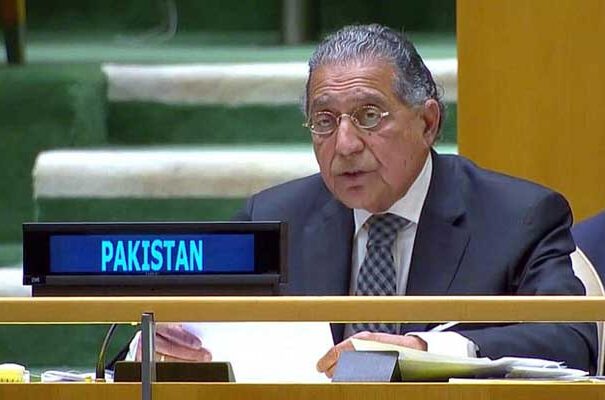WNAM REPORT: Pakistan has called for an “immediate and unconditional” ceasefire in Sudan amid continuing violence between the warring parties, warning that internal divisions and external interventions can destroy great nations.
“The parties need to find a sustainable political resolution to the conflict through dialogue,” Ambassador Munir Akram, Pakistan’s permanent representative to the UN, told the the UN Security Council on Monday, emphasizing that the war will not be resolved on the battlefield as it will only bring more death and destruction for the Sudanese people.
“The bloodshed and brutalities against the civilians must end now; The violations of International Humanitarian Law must stop,” he stressed, while speaking in a debate on the “Protection of Civilians” in Sudan.
The conflict broke out in April 2023 and has continued unabated as, with some 11.3 million people caught in crossfire between Sudanese Armed Forces (SAF) and the Rapid Support Forces. Over 8 million people have been displaced internally since the conflict began, and around 24.6 million people — nearly half of Sudan’s population, are in need of humanitarian assistance and protection services.
Meanwhile, the UN Food and Agriculture Organization (FAO) reported that conflict and displacement are the main drivers of food insecurity, “exacerbated by restricted humanitarian access,” according to Deputy Director-General Beth Bechd.
The latest Integrated Food Security Phase Classification (IPC) analysis underscores the disproportionate impact on vulnerable groups, particularly women, children, and the elderly.
Disrupted food production and collapsing market conditions have compounded the crisis. The IPC Committee has projected that famine could spread to five additional regions, including Um Kadadah and El Fasher, by mid-2025, with 17 other areas at high risk without urgent intervention.
In his remarks, Ambassador Akram, the top Pakistani diplomat at the UN, said Pakistan upholds firmly the unity, sovereignty and territorial integrity of Sudan. “Any scheme that undermines these Charter principles will not yield a durable solution to the conflict and will further undermine regional and international peace and security.”
Describing the worsening food security situation in Sudan as “alarming”, the Pakistani envoy called on the international community to help alleviate the humanitarian crisis and bridge the 36% funding gap for humanitarian appeals relating to the country. In 2025, Sudan will need $4.2 billion to support nearly 21 million people.
In this regard, he expressed appreciation for the recent steps taken by the Sudanese authorities in opening additional air, sea and land borders for humanitarian aid and extending the Adre border crossing, which has brought some improvement in the humanitarian situation.
“Most importantly,” Ambassador Akram added, “the humanitarian situation in Sudan should not be used as a pretext for foreign intervention in Sudan.
“The international community must unite to support a common vision for return to peace and normalcy in Sudan. Foreign interference in the internal conflict of Sudan must stop. The UNSC arms embargo on Sudan must be respected.”


